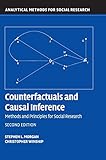Counterfactuals and causal inference [electronic resource] : methods and principles for social research / by Stephen L. Morgan, Christopher Winship.
Series: Analytical methods for social researchPublication details: New York, NY : Cambridge University Press, c2015.Edition: Second EditionDescription: xxiii, 526 pages : illustrations ; 26 cmContent type:- text
- computer
- online resource
- 9781107065079 (hardback)
- 9781107694163 (paperback)
| Item type | Current library | Call number | Status | Date due | Barcode | |
|---|---|---|---|---|---|---|
 eBooks
eBooks
|
Digital Library | Available |
Revised edition of the authors' Counterfactuals and causal inference, published in 2007.
Includes bibliographical references (pages 451-496) and index.
Machine generated contents note: Part I. Causality and Empirical Research in the Social Sciences: 1. Introduction; Part II. Counterfactuals, Potential Outcomes, and Causal Graphs: 2. Counterfactuals and the potential-outcome model; 3. Causal graphs; Part III. Estimating Causal Effects by Conditioning on Observed Variables to Block Backdoor Paths: 4. Models of causal exposure and identification criteria for conditioning estimators; 5. Matching estimators of causal effects; 6. Regression estimators of causal effects; 7. Weighted regression estimators of causal effects; Part IV. Estimating Causal Effects When Backdoor Conditioning is Ineffective: 8. Self-selection, heterogeneity, and causal graphs; 9. Instrumental-variable estimators of causal effects; 10. Mechanisms and causal explanation; 11. Repeated observations and the estimation of causal effects; Part V. Estimation When Causal Effects Are Not Point Identified by Observables: 12. Distributional assumptions, set identification, and sensitivity analysis; Part VI. Conclusions: 13. Counterfactuals and the future of empirical research in observational social science.
"In this second edition of Counterfactuals and Causal Inference, completely revised and expanded, the essential features of the counterfactual approach to observational data analysis are presented with examples from the social, demographic, and health sciences. Alternative estimation techniques are first introduced using both the potential outcome model and causal graphs; after which, conditioning techniques, such as matching and regression, are presented from a potential outcomes perspective. For research scenarios in which important determinants of causal exposure are unobserved, alternative techniques, such as instrumental variable estimators, longitudinal methods, and estimation via causal mechanisms, are then presented. The importance of causal effect heterogeneity is stressed throughout the book, and the need for deep causal explanation via mechanisms is discussed"--


